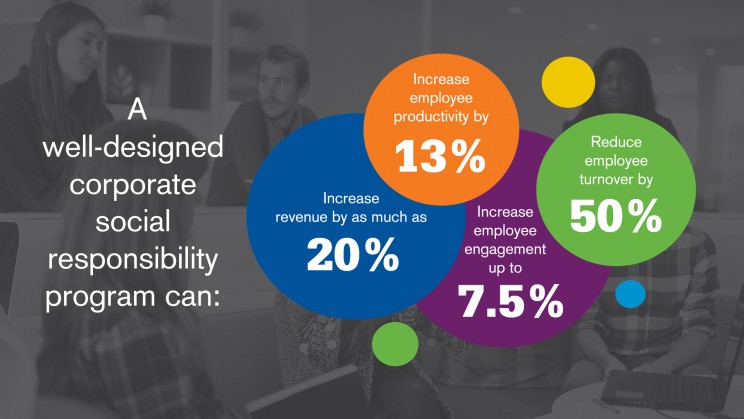John Allen, RingCentral US | January 21, 2021
5 Reasons Small Businesses Should Adopt a CSR Strategy & How To Do It
Any business owner–particularly small to medium enterprises (SMEs)–will know one of the crucial keys to success is being able to adapt your business to the times.
As a good leader, you should be able to spot where the business needs to evolve. This could be anything from confronting workplace dynamics to transforming digitally. If not, you could be heavily criticized for ignoring calls for change. Not only could this impact your profits, but also the way the world views your business.
If Netflix had stayed delivering DVDs to your door, they would never have become the global sensation they are today. They saw the way the world was headed and refused to be left behind. Instead, they were the frontrunners of online streaming, seeing off competitors that had been around even longer than them. This is why Blockbuster fell, but Netflix flourished.
Just like adapting to changes in technology, businesses need to adapt their CSR strategies.
It was revealed that 76% of millennials research whether a company is being authentic about their stand on social or environmental issues. This kicked many small businesses and corporations into gear. After all, a millennial has huge power. Not only as a consumer, but also as someone who may be looking for employment in a company with proven social responsibility.

What is Corporate Social Responsibility?
In short, corporate social responsibility (CSR) refers to business practices that benefit employees, stakeholders, the environment, and society as a whole. It’s all about being accountable. Whether this means switching to green energy or encouraging employees to cycle to work, CSR is here to stay. Not only that – CSR is growing, and it’s proven to benefit a company’s profits, as well as its purpose.
From huge corporate companies selling thousands of coffees a day to a small business call center, each business has a responsibility when it comes to their social impact.
Small businesses are not exempt! You must respond to the calls for change like any other. Countless companies across the globe have been releasing their strategies to tackle their CSR strategy (or lack thereof), and so should you.
5 Reasons Why Small Businesses Should Adopt a CSR Strategy
Recruits, Retains, and Engages Employees
Employee motivation is more often than not a top concern for employers. It’s harder than it may seem to motivate a team of people through a monthly pay packet alone. A survey of nearly 25,000 people aged 18-35 from 186 countries revealed that 40% of young people think sense of purpose/impact is one of the most important criteria when considering a career opportunity. And 55% of employees would choose to work for a socially responsible company, even if it meant a lower salary.
In addition to retaining your workforce, CSR programs are proven to be effective at recruiting the best and brightest. When America’s Charities surveyed companies for their Snapshot Research, 88% of business leaders said effective employee engagement programs help them attract and retain employees. It doesn’t matter if your competitor has the best call center software 2021 has to offer. If you’re a smaller company with a conscience, you have an edge over your larger competitors whose CSR programs aren’t up to scratch.
Improves Public Image
As a business, authenticity is key. Your efforts to perfect your approach to social responsibility must be genuine.
For example, organic coffee chain Pret a Manger has long been passionate about fighting homelessness. ‘The Pret Foundation’ is their charity that aims to alleviate hunger, homelessness, and poverty. They even actively employ homeless people to give them another chance at life.
This is excellent for society – and Pret’s public image. As a small business doing something positive for the community, you’re likely to garner all the right attention.
Increases Sales
When companies implement a solid CSR strategy, their sales increase. This is often an indirect impact, but an impact nonetheless. Since consumers are becoming more conscious about who they buy from, your business could have the upper hand over a competitor who has no CSR or a CSR program that is perceived as inauthentic. Consequently, the customer is more likely to choose your brand. And if you keep your customer service up, you’ll enjoy their repeated business. Interactive voice response (IVR) or live chatbots ensure you’re always one step ahead when it comes to your competitors and how they interact with customers.
Improves Loyalty
When you adopt a CSR strategy, expect improved loyalty from customers and employees alike. As a leader, you should constantly evaluate what your employees think about your CSR. A good grasp of social responsibility is also important to stakeholders and shareholders. People admire businesses that take positive steps toward improving the world. Hence, they are more likely to stick with you. They may not be interested in another business offering the same service but without a CSR pledge.
Leaves a Green Footprint
Arguably the most important reason of all to take CSR seriously is that you’re being kinder to the community and the planet. A staggering 12.5% of the world’s carbon pollution since 1854 has been produced by just five corporate giants. But this doesn’t mean even your small carbon footprint as a SME shouldn’t be challenged.
Every business has a responsibility, no matter how small. It sets a good precedent for future entrepreneurs who are thinking about starting their own business when they see other SME marketing strategies tackling climate change from the start.
How to Adapt Your Business
Enhancing your CSR as a business will impact your sales, employee motivation, and carbon footprint. According to a Project ROI study, a well-designed CSR program can increase employee engagement by up to 7.5%, increase employee productivity by 13%, reduce employee turnover by 50%, and increase revenue by as much as 20%.
These long-term results mean you should go above and beyond to compile the right, comprehensive CSR plan for your business. First, survey your employees to understand their interests, values, and expectations. Then loop your leadership team in on a hosted private branch exchange (PBX) group call to dive into your organization’s goals and reflect on what your employees said in light of your corporate vision. Finally, develop a plan for how you’re going to demonstrate your CSRyourCSR. Often, it helps to engage an external organization to help guide you through this process
Get Involved in Giving and Volunteering
Your corporate social responsibility is boosted when you empower your employees to demonstrate their passions. America’s Charities Snapshot Research shows time and again that when you invest in your employees, they, in turn, invest in you and your business. It’s an excellent way to show people that you care about them.
Think about how much the well-being of your employees affects your business. Your efforts to keep your team motivated and productive can be tied-in directly with your corporate social responsibility pledge. Offer employees cycle-to-work schemes or vouchers for meeting weekly targets… Provide opportunities to support their community through workplace giving or paid time off to volunteer their time or talent. Incentives like these are vital for high employee engagement.
Moreover, the business as a whole could volunteer. For example, you could give up your time for a community project or donate supplies to a local charity with the help of your workforce. Give employees the day off and ensure that they’re paid. Depending on the size of your company, you could do this once a month or once a year.
Create a CSR Department
Show that you truly care about making a difference by restructuring your company. A CSR department would work closely with Human Resources. But, CSR would focus more on environmental issues and society, while HR would have an input on employee-related matters.
And if customers, employees, or other stakeholders had ideas on how your CSR could be better, they could reach out via SMS customer support. Including stakeholders in your corporate social responsibility plans also makes you as transparent as possible.
Timpson is highly regarded as being one of the best companies to work for in the UK. The support, training, and benefits they give to their employees (whom they refer to as their family) are admirable.
One of their benefits includes a hardship fund, whereby employees can apply for an interest-free loan from Timpson. This is then paid back through the employee’s payslip at a small and affordable rate every month. (Employee Assistance Funds go a step further by supporting employees when they are facing financial hardships.) In addition to this employees have access to:
- A mental health counselor
- Up to £250 towards driving lessons
- A £1000 weekly lottery
- Free holiday homes across the UK
- A wedding support fund
Timpsons also try to hire those with criminal convictions who are looking for a job. They cite that £18bn a year is the cost of reoffending for the taxpayer.
Implementing a CSR department would be an ideal place to start making changes for the better in your firm. Including a call forwarding service so employees are always able to reach you is a vital component of any CSR plan.
Work with the Local Community
Developing partnerships with local authorities and supporting nonprofits are another great way to adapt your business to a CSR approach. You can start by outreaching to community leaders to create a strong relationship, and begin your efforts to be more involved. Not only does this boost your company profile, but it also helps local residents to see that you’re having a positive impact on their local community.
You could also sign up for sponsorship deals and fundraisers, whether it be for the local town fair or school play. For example, the business could donate a small percentage of sales to a fundraising project by a local organization. Use bulk email software to cast your net wide among out to the community, and see what you get back!
What Does the Future of a CSR in Business Look Like?
Corporate social responsibility is here to stay. Businesses are under more pressure than ever to take accountability for their actions. Consumers actively look to buy from businesses that are doing good for the world around them. This can mean hiring a more diverse team, investing in project management software or even, a comprehensive CSR technology and service solution, cutting down their CO2 emissions, or generally taking care of their staff.
If you neglect the call for more CSR even as a small business, you could find yourself falling into the shadows when your competitors are shining.
About the author: John Allen, Director, Global SEO at RingCentral, a global UCaaS, VOIP and teleconference services provider. He has over 14 years of experience and an extensive background in building and optimizing digital marketing programs. He has written for websites such as Multibriefs and Toolbox.

Get Resources and Insights Straight To Your Inbox
Explore More Articles
For Fifth Consecutive Year America’s Charities Named ‘Best Nonprofit To Work For’
Washington, D.C. – April 1, 2025 – America’s Charities, the nonprofit that mobilizes the power of giving as a leading provider of volunteering, workplace giving,…
Read ArticleWorkplace Fundraising + Volunteering Summit (April 2nd and 3rd, 2025)
Join us in attending this virtual summit! The America’s Charities team is joining up with other leading voices in the workplace giving space for a…
Read ArticleThe Time to Act is Now
The results of the 2024 National Assessment of Educational Progress (NAEP) are in, and the findings are, in a word, heartbreaking. This assessment serves as…
Read ArticleGet Resources and Insights Straight To Your Inbox
Receive our monthly/bi-monthly newsletter filled with information about causes, nonprofit impact, and topics important for corporate social responsibility and employee engagement professionals, including disaster response, workplace giving, matching gifts, employee assistance funds, volunteering, scholarship award program management, grantmaking, and other philanthropic initiatives.







